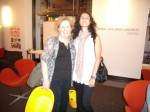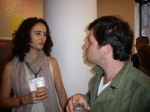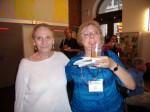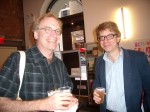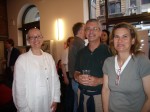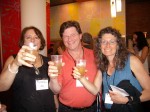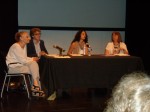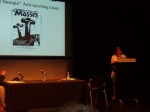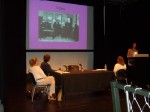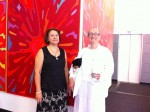“O’Neill in Bohemia,” June 22-26, Greenwich Village, NY. The Susan Glaspell Society was once again pleased to be participating in the International Eugene O’Neill Conference with a full day of events on Saturday, June 25, 2011.
12:00 —SGS Business Meeting in Dean’s Conference Room, Gallatin Building, 1 Washington Place. Meeting minutes are posted.
2:00—Panel: “‘The Beloved Community’: The Provincetown Players in Context,”in Jerry H. Labowitz Theatre, 1 Washington Place @ Broadway. Chair and organizer: Sharon Friedman, the Gallatin School, New York University.
Recent scholarship on Susan Glaspell and other writers and artists of the Provincetown experiment has probed and deconstructed the by now mythical narratives of its founding and evolution to provide a more historicized and intertextual analysis of the Players and the plays. These studies situate the group at an important historical moment—the development of socialism, feminism, psychoanalysis, modernism, and the emergence of global warfare—and reveal shared stylistic and thematic concerns as well as their profound connections to other writers, cultural institutions, ideologies, discourses, and events of the period. Presentations will build on this research to explore the synergies between plays produced by the Provincetown (1916-1922) and writings produced by Village institutions, such as the Washington Square Players, the Liberal Club, The Masses, and Heterodoxy, with which they shared members, ideals, and a range of responses to events and conditions of this period.
Papers: “Oligarchy of the Artists: Jig Cook, Greenwich Village, and American Cultural Identity,” Drew Eisenhauer, Mayor of Paris Research Fellow, University of Paris, Diderot;
“A Luncheon for Suffrage: Theatrical Contributions of Heterodoxy to the Enfranchisement of the American Woman,” Noelia Hernando-Real, Universidad Complutense de Madrid;
“Staging Bohemia: Theatrical Self-Representation in Greenwich Village,” Brenda Murphy, Board of Trustees Distinguished Professor of English, University of Connecticut.
3:45—“Performing Bohemia”: A Concert Reading by Susan Glaspell Society members along with professional actors, adapted and assembled by Cheryl Black (University of Missouri) from Glaspell’s “The People,” the pages of the socialist journal The Masses, and sundry songs, poems, speeches, and manifestoes from the pens of the Provincetown Players and their Village cohorts, presented in the Jerry H. Labowitz Theatre. For photos of this event, follow the link to O’Neillian Win Goodbody’s gallery from “Links” page.
5:30—SGS Provincetown Punch Reception. We toasted “The Beloved Community” with their “Fish House” punch from the recipe preserved by Provincetown executive committee member Edna Kenton. The Players’ potent potable combines two kinds of brandy, rum, black tea, sugar, lemon juice, and ice, and was served to Glaspellians and O’Neillians in the gallery space adjacent to the Jerry Labowitz Theatre.
- Sherry Engle and Noelia Hernando-Real
- Noelia and Michael Winetsky
- Sharon and Judi Barlow pay tribute to Jig’s elixir
- Drew Eisenhauer enjoys the punch with Kurt Eisen
- J. Ellen Gainor with Jan Balakian
- Martha Carpentier and Steve Bloom toast
- The panel fields questions from the audience. From left to right: Sharon Friedman, Drew Eisenhauer, Noelia Hernando-Real, and Brenda Murphy
- Brenda Murphy presents on SGS panel
- Noelia presents
- Martha and Ellen

